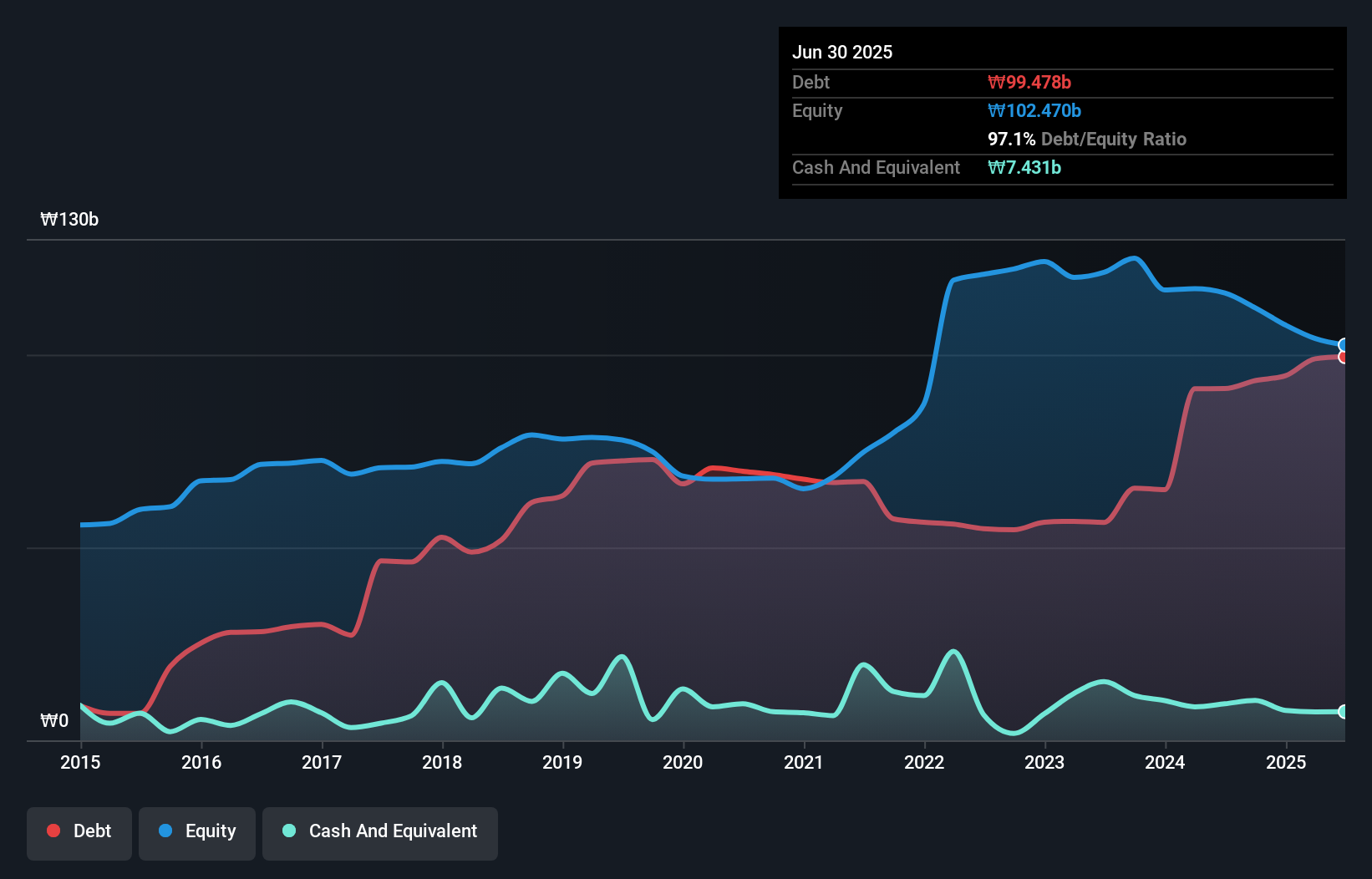- South Korea
- /
- Consumer Services
- /
- KOSDAQ:A063170
We Think Seoul Auction (KOSDAQ:063170) Has A Fair Chunk Of Debt
David Iben put it well when he said, 'Volatility is not a risk we care about. What we care about is avoiding the permanent loss of capital.' So it might be obvious that you need to consider debt, when you think about how risky any given stock is, because too much debt can sink a company. We note that Seoul Auction Co. Ltd. (KOSDAQ:063170) does have debt on its balance sheet. But the real question is whether this debt is making the company risky.
What Risk Does Debt Bring?
Debt and other liabilities become risky for a business when it cannot easily fulfill those obligations, either with free cash flow or by raising capital at an attractive price. If things get really bad, the lenders can take control of the business. However, a more frequent (but still costly) occurrence is where a company must issue shares at bargain-basement prices, permanently diluting shareholders, just to shore up its balance sheet. Of course, the upside of debt is that it often represents cheap capital, especially when it replaces dilution in a company with the ability to reinvest at high rates of return. The first step when considering a company's debt levels is to consider its cash and debt together.
What Is Seoul Auction's Debt?
You can click the graphic below for the historical numbers, but it shows that as of June 2025 Seoul Auction had ₩99.5b of debt, an increase on ₩91.2b, over one year. On the flip side, it has ₩7.43b in cash leading to net debt of about ₩92.0b.

How Healthy Is Seoul Auction's Balance Sheet?
Zooming in on the latest balance sheet data, we can see that Seoul Auction had liabilities of ₩72.3b due within 12 months and liabilities of ₩39.8b due beyond that. On the other hand, it had cash of ₩7.43b and ₩21.8b worth of receivables due within a year. So its liabilities outweigh the sum of its cash and (near-term) receivables by ₩83.0b.
This deficit is considerable relative to its market capitalization of ₩125.4b, so it does suggest shareholders should keep an eye on Seoul Auction's use of debt. Should its lenders demand that it shore up the balance sheet, shareholders would likely face severe dilution. There's no doubt that we learn most about debt from the balance sheet. But it is Seoul Auction's earnings that will influence how the balance sheet holds up in the future. So if you're keen to discover more about its earnings, it might be worth checking out this graph of its long term earnings trend.
View our latest analysis for Seoul Auction
In the last year Seoul Auction had a loss before interest and tax, and actually shrunk its revenue by 41%, to ₩17b. To be frank that doesn't bode well.
Caveat Emptor
Not only did Seoul Auction's revenue slip over the last twelve months, but it also produced negative earnings before interest and tax (EBIT). Indeed, it lost ₩6.5b at the EBIT level. When we look at that and recall the liabilities on its balance sheet, relative to cash, it seems unwise to us for the company to have any debt. Quite frankly we think the balance sheet is far from match-fit, although it could be improved with time. Another cause for caution is that is bled ₩8.6b in negative free cash flow over the last twelve months. So in short it's a really risky stock. When analysing debt levels, the balance sheet is the obvious place to start. However, not all investment risk resides within the balance sheet - far from it. These risks can be hard to spot. Every company has them, and we've spotted 3 warning signs for Seoul Auction (of which 2 are significant!) you should know about.
At the end of the day, it's often better to focus on companies that are free from net debt. You can access our special list of such companies (all with a track record of profit growth). It's free.
New: Manage All Your Stock Portfolios in One Place
We've created the ultimate portfolio companion for stock investors, and it's free.
• Connect an unlimited number of Portfolios and see your total in one currency
• Be alerted to new Warning Signs or Risks via email or mobile
• Track the Fair Value of your stocks
Have feedback on this article? Concerned about the content? Get in touch with us directly. Alternatively, email editorial-team (at) simplywallst.com.
This article by Simply Wall St is general in nature. We provide commentary based on historical data and analyst forecasts only using an unbiased methodology and our articles are not intended to be financial advice. It does not constitute a recommendation to buy or sell any stock, and does not take account of your objectives, or your financial situation. We aim to bring you long-term focused analysis driven by fundamental data. Note that our analysis may not factor in the latest price-sensitive company announcements or qualitative material. Simply Wall St has no position in any stocks mentioned.
About KOSDAQ:A063170
Mediocre balance sheet with low risk.
Market Insights
Community Narratives



